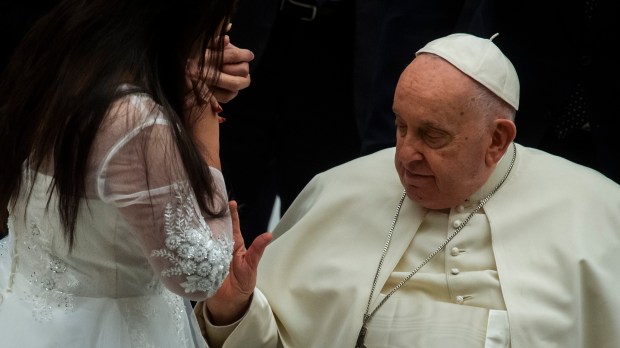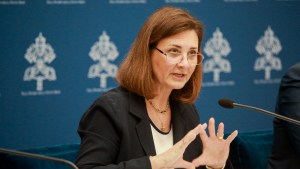If an ecclesiastical judge “does not pray, it is best for him to resign,” Pope Francis said as he inaugurated the 95th judicial year of the Tribunal of the Roman Rota – the Church’s highest court of appeal – in the Vatican on January 25, 2024.
Addressing the judges who are responsible for ruling on the validity of sacramental marriages, he warned against “the false conviction that the best answer is always nullity.”
“Dear judges, without prayer, it is impossible to be a judge,” the Pope told his audience. In order to decide on the nullity of marriages “it is decisive to count on the light and the strength of the Holy Spirit.”
Pope’s reforms on the nullity of marriage
During the meeting, the Pope spoke of the various reforms implemented under his pontificate to simplify the process of recognizing the nullity of marriages. For example he mentioned the “the abolition of the requirement of a double compliant judgement in nullity cases, the introduction of the shorter trial before the diocesan bishop, as well as the effort to streamline and make the work of the courts more accessible,” which were detailed in the 2015 Motu proprioMitis iudex Dominus Iesus.
He underlined that these reforms “must not be misunderstood and the need to serve the faithful with a ministry that helps them to grasp the truth about their marriage must never be neglected.”
Francis assured the judges that it was not a matter of favoring “the nullity of marriages, but the speed of processes as well as the simplicity due them,” so as to not let “the clouds of doubt overshadow the hearts of the faithful awaiting a decision regarding their state.”
“Precisely in the light of mercy towards people and their consciences, judicial discernment on nullity is important,” said Francis.
An important responsibility that requires the Holy Spirit and prayer
Reaching a moral certainty on the nullity of a marriage through discernement is however “a great responsibility” as it “strongly influences the life of people and families,” the Pope said.
He also highlighted the “presumption of validity” that prevails in canonical trials, as the Church protects “the light of the truth on indissoluble marriage.”
The head of the Catholic Church then made a number of recommendations to ecclesiastical judges, asking them firstly to cultivate their prayer life and rely on the Holy Spirit. “The judge’s prayer is essential to his task. If a judge does not pray or cannot pray, he had better go and do another job,” he asserted spontaneously, not reading off his prepared speech.
“Discernment is performed ‘on our knees’ – and if a judge does not know how to kneel in prayer, it is best for him to resign – imploring the gift of the Holy Spirit: only in this way do we arrive at decisions that lead in the direction of the good of individuals and the entire ecclesial community.”
Arriving at the right decision
“The objectivity of judicial discernment demands, then, to be free of any prejudice, either for or against the declaration of nullity,” the Pope also stated. He encouraged them to free themselves of “both the rigorism of those who would claim absolute certainty and of an attitude inspired by the false conviction that the best answer is always nullity.”
Quoting John Paul II, Francis pointed to the “risk of false compassion that […] would be pastoral appearance alone.”
“Just discernment implies an act of pastoral charity, even when the ruling is negative. And also a risk,” Francis said. In fact he also called for investigations to “be carried out carefully, so as not to incur a hasty and aprioristic judgement.”
In conclusion, he asked the judges to pray for him, confiding that his work is “at times […] enjoyable, but not easy.”


